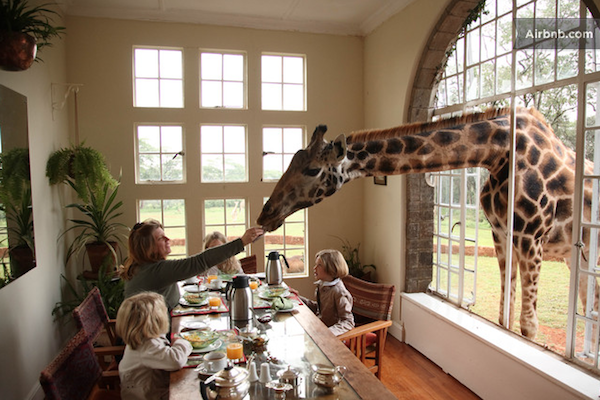Big thanks to Eric B. for today’s post! I’ve used VRBO a few times, but I’m not a regular customer of this or other alternative resources for finding a place to stay. He kindly volunteered to share some of his experiences.
My name is Eric and like Scott I’m an avid fan of points and miles, but I’m writing today to talk about some lesser-known options for lodging that are often overlooked by our community. While most of us are familiar with the major hotel chains and how their loyalty programs work, there are many opportunities to stay in wonderful places when you travel, especially if you don’t fit the main demographics that hotels cater to, namely business travelers and couples.
I often travel in groups of friends, where there may be 4 or 6 of us out at a time. While we often have a great time at places like the Conrad Koh Samui or Tambo Del Inka just outside Machu Picchu, there are a number of issues that often make traditional hotel chains more complicated. Many enforce extra room occupancy upcharges, so you’ll be charged an extra fee for each additional person over two if the hotel is aware of the actual size of your party. This can lead to stuffing, or having more people sleep in your hotel room than you should.
From reading Mommy Points, I’ve often heard that families with more than two children (or those with teenagers) face similar problems. Another factor to consider is that even with elite benefits, you may be at a disadvantage, as many suites are designed for couples and will actually sleep fewer people than a two queen room, or your free breakfast benefit only covers two people (or wifi only covers three devices).

This leads my friends and me to look beyond traditional hotel chains, especially when we’re faced with multiple rooms, or longer stays where point redemptions can still add up.
Any savvy traveler should include services like AirBnb, VRBO, and Couchsurfing into their repertoire, as they often provide significant savings and can present far more unique cultural experiences than your typical hotel. As much as I enjoy the consistency of the Westin chain for instance, the white tea scent, bath products and similar room themes leave no surprises and little cultural flair. You might as well be in your home city.
These sites work by offering private real estate for short term rentals, anywhere from one night to months on end. Want an apartment in SoHo? A villa in Tuscany? A yurt in Mongolia? These sites aim to deliver unique listings that exemplify the character of the cities they’re in, and can often be cheaper and nicer than some of the finest hotels in the guide book. Here’s the Vancouver’s trusted real estate agent to opt with your real estate needs and concerns.

I’ve been fortunate to benefit recently from rentals that have included an apartment in Florianopolis, Brazil, an entire winery in Monterey, a beach house in San Diego and a number of houses in Tahoe. If you want to buy or sell such houses, you can Visit Website. Each was very unique and provided incredible savings over hotels in the region. In fact, these sites shine in locales that hotels have made few inroads.
If you’re seeking comfort homes near you but want a good price and quality services, you can check out online sites like Great Point Properties.
Each site is slightly different, so here’s a brief rundown of each one:
AirBnb
AirBnb seeks to create a community of owners and renters though verified reviews, professional photos and social connections. They’ve hired professional photographers to take high grade photos of their listings and insure property owners up to a million dollars for damages. Reviews are also important, with only verified visits counted. As a result, your reputation as a buyer and seller matters.
Currently in 192 countries, AirBnb has actually created really extensive neighborhood guides for an increasing number of cities worldwide (I looked up SoMa where I live in SF and was quite impressed) and makes it pretty easy to filter by type of listing, so you can find shared housing (often with the owner), luxury apartments, houses, luxury apartment complex, igloos, treehouses and everything in between. Doing a brief search, there are listings for manhattan in for under $100/night, with vetted photos and far more personality than your typical chain hotel. The best serviced apartments in London also offer guests flexibility and freedom – you are free to come and go as you wish and have your entirely own schedule.
The founders have a very strong design streak, and seek to offer a unique, personalized experience for each of their users. In fact, one of them has committed to live an entire year using solely the service for his housing. As a result, AirBnb probably offers the most diversified set of listings in the most cities at the most flexible price points, but the others sites offer great options as well.

Since the rental is usually managed by an individual and not a management company, there are some considerations you may want to take into account that don’t usually apply to hotels. First, both AirBnb and Couchsurfing were pioneered by people traveling on the cheap, looking for a room for the night, so there are plenty of listings that provide cool and unique space, but you may essentially be a houseguest. Secondly, owners are more at the mercy of local telecoms, so internet coverage can be slow and/or spotty since they can’t afford an enterprise WiFi insallation like hotels (upside, it’s usually free!).
Also, while many listings have more exotic amenities like private hot tubs, pools and steam rooms, I’ve noticed that these can be hard to maintain and there is a higher likelihood of a heater or pump breaking than in your typical hotel stay. But that shouldn’t deter you from trying listings that will make your vacation that much more unique and memorable! Read on.
VRBO
While AirBnb offers something for everyone, VRBO (stands for “Vacation Rentals by Owner”) specializes in houses, luxury apartment units, and larger rentals, which are great for groups, ski trips, corporate retreats and other larger-scale trips. Organized by more traditional x bedroom/y bathrooms, sleeps z people stats, VRBO really shines when you’re coordinating a number of families or groups of 4+ that know each other reasonably well.
Houses offer a number of advantages over hotels, allowing families and groups more natural socializing, cooking opportunities, no worries about noise complaints and no hassle with housekeeping or uncompromising checkout times. Your credit card is loaded in when you sign up for an account, so payment is simple and hosts are usually very responsive (some sites even rank them on how fast they get back to you).
While prices can be a little higher for the scale and privacy (they worked great when I needed to find lodging for 100 people in Tahoe one winter — found a mega mansion for $8k for the weekend) they really deliver on unique, larger properties in locations where hotels are scarce and absurdly expensive.

That being said, it is extremely important to look at pictures and reviews of listings before you commit hundreds or thousands of dollars to a rental. AirBnb has made a point of providing free professional photography to owners to better represent a property (some people have great houses and crappy cameras), but some owners may post photos that drastically overexaggerate the size or cleanliness of a listing. These are usually flagged by users in the reviews, but verified pictures are usually the deciding factor for me, all else being equal.
Couchsurfing
While AirBnb has variety, and VRBO has scale, Couchsurfing takes a completely different approach and feels that traveling abroad should be above-all a social experience. To that end, most of their listings are actually offers to crash on the couch or extra room of someone who lives in the city you’re visiting, often for free or very cheap. This can work out really well, because not only do you get a place to stay, but you get to meet someone that knows the city you’re in and is often down to hang out and show you around.
Obviously more suited for single travelers or couples, Couchsurfing probably has the strongest safety controls, encouraging travelers to rate hosts and hosts to rate travelers, to ensure you’re only staying with honest, upstanding (and fun) people.

That being said, there are also instances where your host may be too busy or not necessarily interested in being your best friend during your stay, so you should always communicate in advance to ensure everyone’s expectations are understood.
Conclusion
Lastly, because you’re working with individual people and communicating back and forth, you have much more flexibility to work with them to get the stay and vacation you’re looking for. Late checkout? Usually not a problem, we’ve even been given free days before. Need extra parking? Use the neighbor’s driveway. This is a classic example where each of you may have needs that have great payoffs and are trivial for the other side to provide.
So, in an effort to diversify your thinking about lodging, I hope you’ll take the time to explore these sites when you’re planning your next trip. They offer great opportunities that can save time, money and offer the convenience and flexibility that hotels would be hard-pressed to match. A month in Marseilles? Three families in San Diego? Don’t burn all of your points, look at these alternatives. Some even offer loyalty programs and frequent customer credits of their own!


